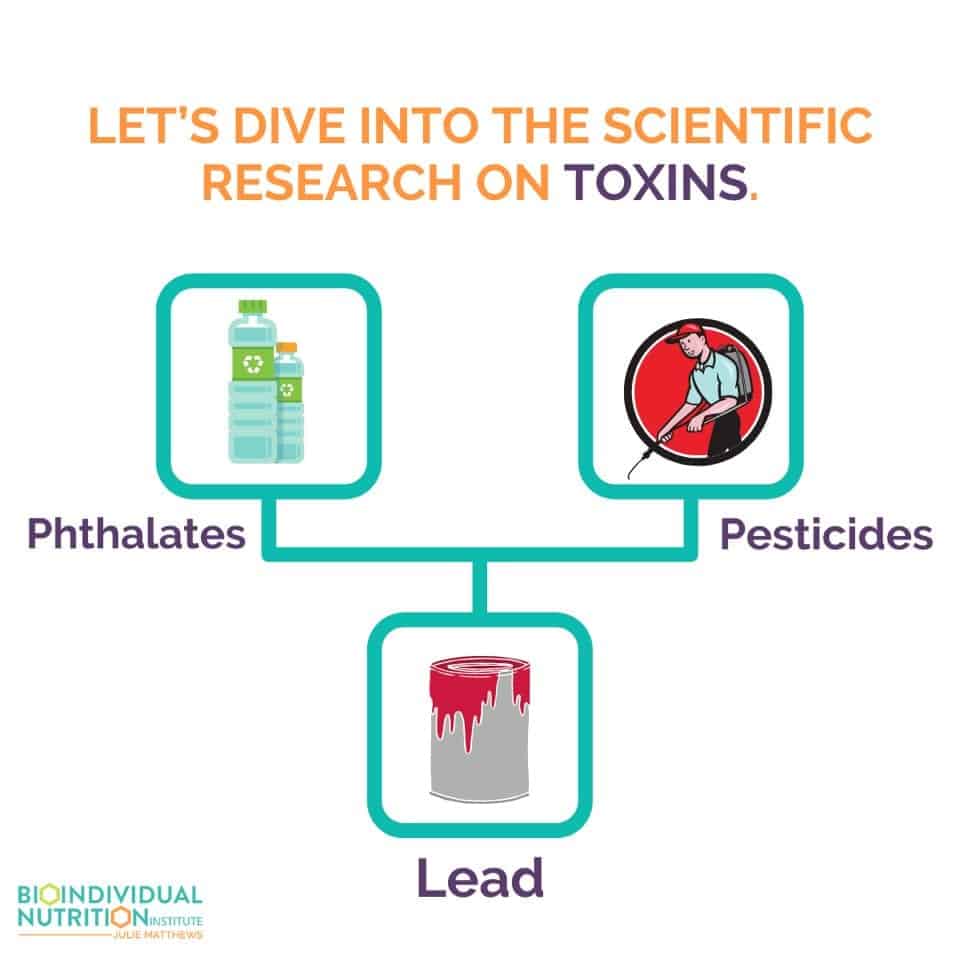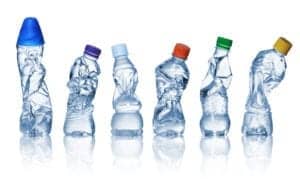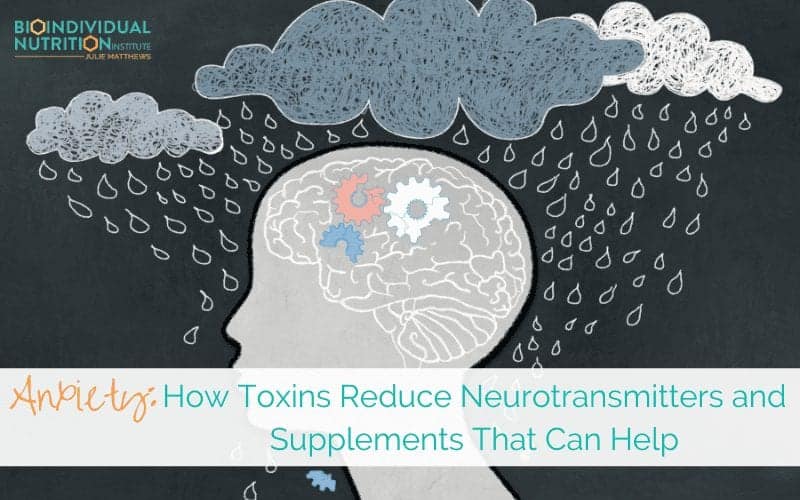
Ruminating thoughts, worry, fears, OCD or obsessive tendencies or thoughts, PMS, sleep issues, anger, rage…
Do you or a loved one experience these symptoms?
How about, butterflies in your stomach, physical tension in your muscles, pain… or self-medicating with wine in order to relax?
Honestly, I can relate to many of these symptoms.
My good friend and nutrition colleague, Trudy Scott, specializes in anxiety. Through my years of nutrition study and practice – and her help – I’ve been able to address many of these symptoms and significantly reduce, or eliminate, them! And you can too!
See, these symptoms are often from low neurotransmitter levels, often due to biochemical insufficiencies, as well as environmental exposures.
And the good news is there is something natural you can do about it!
Trudy Scott is putting together her 6th Anxiety Summit: This one is on Toxins, Medications, and Infections.
She has given me permission to share some of this amazing information with you from her upcoming summit interview, GABA and Tryptophan: Anxiety-Toxin Connections.
Serotonin and GABA
In it she explains that GABA and tryptophan are amino acids which are used as supplements to boost your neurotransmitter levels (GABA and serotonin, respectively), and improve symptoms of anxiety, depression, and many of the symptoms mentioned above.
She sees clients get very quick results with amino acids (under five minutes!)… if they are needed because of low serotonin or low GABA.
In the interview she explains details of these neurotransmitters, their corresponding symptoms when levels are low, toxins that can interfere with these neurotransmitters and cause anxiety and mood issues, and how to boost them!
I’m so excited to share more with you because I have many clients and Nourishing Hope families that suffer from these symptoms.
In the interview, she explains low serotonin in the following way,
“And then when it comes to low serotonin, these are the symptoms that you could expect; mental worry, this ruminating thoughts, worry, fears, OCD or obsessive tendencies or thoughts, PMS, sleep issues, anger, rage. I often have feedback from mom saying they’ve got kids with huge rage issues. And then with the low serotonin you’ll have the afternoon and the evening cravings. You also may have pain, depression, the winter blues, and you may even have increased anxiety in the winter as well. Similar to the winter blues, we can get more anxious in the winter time as well. And tryptophan is the amino acid that we use in order to support serotonin levels.”
With low GABA, she states,
“It’s more physical tension. You have the butterflies in your stomach, you may feel physically tense in your muscles, you may feel this really tight in your shoulders. You may have pain as well; sleep can be an issue. And often, we self-medicate with wine in order to relax. And then the amino acid for this low level of neurotransmitter is GABA, it happens to be the same name.”
Now that you understand more about two of the neurotransmitters she mentions in the interview, let’s talk about how the toxins in your home can contribute to low levels of these neurotransmitters.
Let’s dive into the scientific research – one of the things I love about Trudy’s work – on toxins and neurotransmitters.
Phthalates
The first toxin she discusses is phthalates. These toxins are found in plastics to make them soft, and are contained in many plastics found in the kitchen, vinyl toys, shower curtains, paint, nail polish, and anything with a fragrance (from candles, to air fresheners, and body care products).
One study looked at 990 university students who were widely exposed to these phthalates which are associated with anxiety, depression, and stress[1]. In another study on prenatal exposure, researchers found that their children who were exposed in utero experienced anxiety, depression, and ADHD[2].
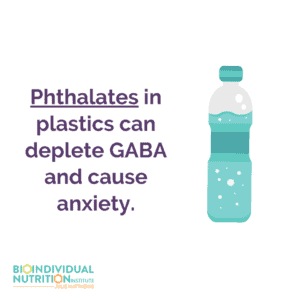 Research shows that phthalate exposure causes anxiety. And in one study on rats, Trudy explains that, “they found that the effects caused by the phthalates could be alleviated by GABA.”[3].
Research shows that phthalate exposure causes anxiety. And in one study on rats, Trudy explains that, “they found that the effects caused by the phthalates could be alleviated by GABA.”[3].
Trudy also explains how these plastics can negatively affect male sex hormones, and anxiety like behavior, and that “GABA could participate in the modulation of these reproductive and behavioral effects of phthalates.”
This illustrates how chemicals can cause anxiety and mood changes and how the amino acids taken orally can help.
Pesticides 
Also, pesticides, including ones we use on our pets and in ant bait, can inhibit GABA.
She discusses one I used to use on my pets, and maybe you do too, called Frontline, known as Fipronil.
She explains that “it works to kill insects by inhibition of glutamate and GABA activated chloride channels. And the main mechanism of action is blocking these GABAA receptors. And what the research is finding is increased anxiety, aggressive behavior, memory problems, and even Alzheimer’s disease have been connected to this particular insecticide.”
After listening to Trudy’s interview, I did some research of my own and even found a study on Fipronil and autism, and the use of vitamin C to help[4]. It states,
“Fipronil and pyriproxyfen used in the studied concentrations had significant toxic effects on juvenile zebrafish brain and behavior. They triggered a high increase in the intensity of the antisocial behavior that is similar to a zebrafish ASD research model. Furthermore, oxidative stress was also affected by these insecticides. However, vit. C supplements significantly reduced the neurotoxicity of insecticide mixture and oxidative stress.”
There is so much fascinating and important information in Trudy’s Anxiety Summit interview!
Lead
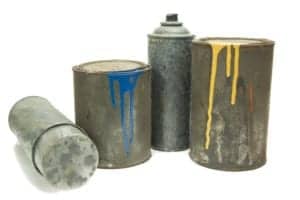
I want to share one more valuable nugget of
information on lead, tryptophan, and vitamin C. Lead is a well known neurotoxin. The most common sources of exposure come from lead-based paint in old homes, from paint chips and dust.
In the study, Trudy explains,
“The rats were given oral doses of lead, they were given ascorbic acid, which is vitamin C, and they were given tryptophan for four weeks. Of course, they saw an increase in the blood lead levels, but they found that there was also anxiety and aggression in these rats. They also saw decreased brain serotonin, increased oxidative stress, and decreased levels of reduced glutathione. But what they found is that in the rats that were given the ascorbic acid and the tryptophan, they found a reversal of all of these.
They found brain serotonin levels went up, the oxidative stress went down, and they found that glutathione levels normalized. And their conclusion is that ascorbic acid and tryptophan can be used to complement chelating therapy in lead neurotoxicity. And clearly, we need robust human studies. But it’s exciting to think that an amino acid like tryptophan could have some of these additional benefits against toxins like lead. And then as I’ve mentioned earlier, fluoride, pesticides, herbicides and phthalates.”
I hope you enjoyed some of this recap of her interview. It was so robust, I was only able to share a small amount of it, so don’t miss it on the Anxiety Summit!
She shares more about: additional neurotransmitters and amino acids, how to use them, what amounts to start with, as well as additional toxins, genes, and nutrients to learn more about to help you or your loved one with anxiety and other mental health needs.
Register today to watch this interview and so many more!
1. Honglv Xu, Xiaoyan Wu, Chunmei Liang, Jie Shen, Shuman Tao, Xing Wen, Wenwen Liu, Liwei Zou, Yajuan Yang, Yang Xie, Zhongxiu Jin, Tingting Li, Fangbiao Tao. (2020). Association of urinary phthalates metabolites concentration with emotional symptoms in Chinese university students.
2. C, Hyland; A, Mora; K, Kogut; A, Calafat; K, Harley; J, Deardorff; N, Holland; B, Eskenazi; S, Sagiv. (2019). Prenatal phthalate exposure and behavior in the CHAMACOS cohort.
3. Huan Liu, Youting Guo, Tongwang Yang, Zhicheng Fan, Minhao Huang, Shuqin Liang, Chunhong Liu. (2018). Intervention effect of gamma aminobutyric acid on anxiety behavior induced by phthalate (2-ethylhexyl ester) in rats.
4. Madalina Andreea Robea, Roxana Jijie, Mircea Nicoara, Gabriel Plavan, Alin Stelian Ciobica, Carmen Solcan, Gilbert Audira, Chung-Der Hsiao, and Stefan-Adrian Strungaru. (2020). Vitamin C Attenuates Oxidative Stress and Behavioral Abnormalities Triggered by Fipronil and Pyriproxyfen Insecticide Chronic Exposure on Zebrafish Juvenile.

